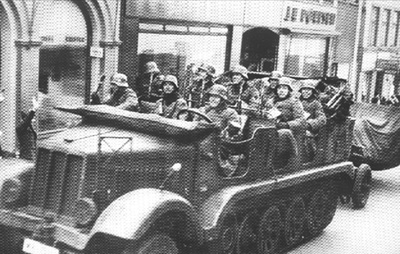NAZI OCCUPATION OF DENMARK

|
On April 9, 1940, Germany invaded Denmark, but it did not treat this
country as badly as it had other invaded countries. There were several
reasons for this less severe treatment.
Because its army and navy were so small, Denmark did not fight the
invasion; German leaders were pleased, and they decided to let the
government of Denmark continue to function normally. Germany allowed
Denmark to keep its king, its government, and its military.
|
Denmark produced a lot food every year and the Germans needed food for
their soldiers. German leaders wanted to stay on friendly terms with the
Danes because they wanted them to supply food for the Nazi troops. If
Germany acted too harshly towards Denmark, the Danes might refuse to give
them the food they needed. Then Germany would have to send in more troops
to take the food by force--something neither country wanted.
Adolph Hitler, the German leader, mistakenly believed that most Germans
were part of a race called the Aryans, and that this race was better than
other races. Because Hitler thought that the Danes were also Aryans, he
decided that it would not be right to hurt them. Because he believed that
the people other countries like Poland were not of the Aryan race, his
Nazi forces treated the Poles very badly. The German army killed many
Polish people.
Despite Germany's efforts to remain friendly with Denmark, the small
country grew tired of helping the Nazis. Denmark wanted the German troops
to leave, but the Danish army and navy were too small to push the Germans
out of Denmark. By the summer of 1942--almost two years after the
invasion--the Danes no longer wanted to sit still and let Germany have its
way. England and America pressured the Danes to actively resist Germany.
Some Danes began to bomb factories that made weapons for the Nazi troops
and planned other acts of resistance.
Worried Nazi officials believed that the Danes would not cooperate with
Germany for much longer. Adolph Hitler and his men waited for an
opportunity to move more troops into Denmark. Finally, on September 26,
1942--the seventy-second birthday of King Christian--Hitler found his
excuse. He had sent a telegram to the king wishing him a happy birthday.
He did not like King Christian's brief response: "My utmost thanks.
Christian Rex." Hitler felt that King Christian's answer was rude and
considered it a sign of the growing Danish inclination to disobey Germany’s
rules.
Hitler decided to send a man named Werner Best to be in charge of
Denmark for Germany. Hitler wanted Best to be very firm with Denmark, and
to rule the small country with an "iron fist." Best had a
different idea, though. He did not want to anger Denmark. Denmark helped
to feed, clothe, and make weapons for German troops. If Germany angered
Denmark by increasing pressure, Best worried that it would be very hard to
force Denmark to give these supplies to Germany. He decided to hold off
German troops for the time being and see what would happen.
Best's plan did not work. The Danes grew more and more frustrated with
Germany, and they tried to make things difficult for the Nazis. By the
spring of 1943, tensions between Denmark and Germany were high.
Next, click
here to read about the Danish resistance to
the Nazis.
